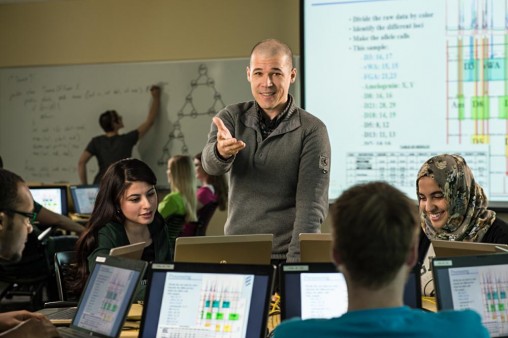
Computer science and engineering professor Travis Doom has pioneered a new classroom environment that enables active learning.
Wright State University is among 20 institutions across the country selected to take part in a national initiative to develop models to advance teaching in STEM fields, particularly in computer and information science.
The initiative, announced by the Association of American Colleges and Universities (AAC&U) on June 19, is called TIDES—Teaching to Increase Diversity and Equity in STEM.
Wright State will receive $299,999 for work to be completed over the next three years. The TIDES initiative is funded with a $4.9 million grant to AAC&U from The Leona M. and Harry B. Helmsley Charitable Trust.
The initiative is designed to support curriculum and faculty development activities in developing the models, which aim for broader institutional change for the advancement of evidence-based and culturally competent teaching in STEM fields (science, technology, engineering, and mathematics).
The objective of the initiative at Wright State is to customize the groundbreaking curriculum work being done in the College of Engineering and Computer Science to address the growing need for, and diversity of, STEM graduates.
The Student Centered Active Learning Environment—or SCALE-UP—model of teaching at CECS harnesses technology in the classroom to make learning more interactive as well as teach teamwork and leadership. The initiative is the first effort to tailor SCALE-UP activities to address the learning needs of a diversifying population of STEM students.
“This highly competitive grant from the AACU puts Wright State University at the forefront of national best practices in computer science education,” said CESC Dean Nathan Klingbeil. “The expected contributions to the science of teaching and learning in a student-centered active learning environment are likely to have broad implications across all STEM disciplines and student populations and will lay the groundwork for Wright State’s continued leadership in that regard.”
To be selected for the initiative, a school had to have a high level of institutional readiness and a demonstrated commitment to sustaining project activities. In addition, it must have a targeted focus on increasing the number of women and underrepresented minorities in the undergraduate computer/information science disciplines and innovation in linking computer/information sciences with other STEM and non-STEM courses.
“We are both inspired and excited to partner with this diverse set of institutions and our colleagues at the Helmsley Charitable Trust to revolutionize not only what we teach at the undergraduate level, but also how we teach STEM content to an increasingly diverse student population,” said Kelly Mack, AAC&U’s vice president for undergraduate STEM education and executive director of Project Kaleidoscope.
Over the next three years of the initiative, TIDES institutions will provide STEM faculty with opportunities to become proficient in incorporating culturally sensitive pedagogies into STEM courses, develop interdisciplinary courses that include the computer/information science disciplines and engage in course implementation grounded in evidence-based pedagogies that are culturally sensitive.
“It is critically important for higher education to find ways to increase success in STEM fields for both women and all students from underserved communities,” said AAC&U President Carol Geary Schneider. “AAC&U is honored to have this opportunity to build on its historic commitment to equity and excellence through the TIDES initiative.”
Learn more about the TIDES project >>
About Association of American Colleges and Universities
The Association of American Colleges and Universities is the leading national association concerned with the quality, vitality and public standing of undergraduate liberal education. Its members are committed to extending the advantages of a liberal education to all students, regardless of academic specialization or intended career. Founded in 1915, AAC&U now comprises more than 1,300 member institutions, including accredited public and private colleges, community colleges, research universities and comprehensive universities of every type and size.

 Wright State receives $3 million grant to strengthen civic literacy and engagement across Southwest Ohio
Wright State receives $3 million grant to strengthen civic literacy and engagement across Southwest Ohio  Fitness Center renovation brings new equipment and excitement to Wright State’s Campus Recreation
Fitness Center renovation brings new equipment and excitement to Wright State’s Campus Recreation  Wright State University settles civil lawsuit against WSARC, now doing business as Parallax Advanced Research Corporation
Wright State University settles civil lawsuit against WSARC, now doing business as Parallax Advanced Research Corporation  Wright State senior paints a new path through fine arts internship
Wright State senior paints a new path through fine arts internship  Wright State recognizes Nursing Professor Kim Ringo for advancing international student success
Wright State recognizes Nursing Professor Kim Ringo for advancing international student success 